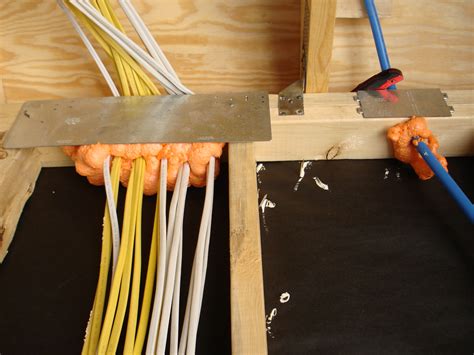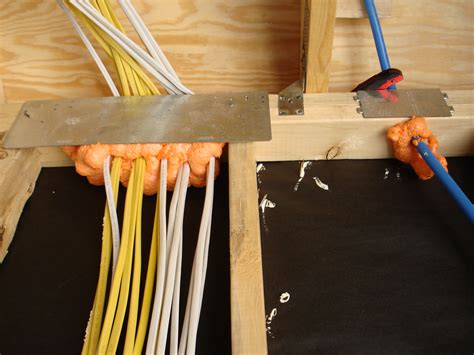how to seal a wire in an electric box In this video we cover the best way to seal the back side of your exterior facing electrical boxes in a new construction custom home. Buy great products from our wide range of high quality Junction Boxes, Connectors & Clips at Wickes. Click & Collect available on eligible items.
0 · sealing electrical wiring holes
1 · sealing electrical wiring
2 · sealing electrical boxes
3 · how to air seal electrical box
4 · electrical sealing holes
5 · air sealing wiring holes
6 · air sealing electrical wiring
7 · air sealing electrical box installation
Easily find replacements for competitor parts with our competitor cross .
What you need to do is apply a paintable silicone acrylic or silicone caulk to the back of the box and around the entry hole before you screw the box to the wall. There should be holes inside the box or external ears for mounting. If you have any boxes you can access from behind, you can use the orange fire stop spray foam. There is also a product out there that is sold as small square sheets of reddish clay-like material. It’s a putty that can be .Seal around installed wiring using caulk or canned spray foam. For ceiling-mounted electrical boxes, install the electrical box in the ceiling drywall, then caulk around the base and caulk all .This blog provides guidance on the best practices for air-sealing electrical boxes, outlining key tips and recommending reliable products suited for the job. With the right materials and .
In this video we cover the best way to seal the back side of your exterior facing electrical boxes in a new construction custom home. You can try to fold the wires to the back of the box, which should help, but to some extent you're really counting on the splice to be secure. Wire nut connections when done right are very secure, but there is some skill / .
Introduction. Sealing Wire & Plumbing Penetrations. Sealing a Ceiling Electrical Box. Sealing Wall Intersections. BONUS: Materials Overview. Sealing Ductwork. Sealing Soffits and Chases. Insulation Ventilation in Rafter Bays. Improving .
Seal around installed wiring using caulk or canned spray foam. For ceiling-mounted electrical boxes, install the electrical box in the ceiling drywall, then caulk around the base and caulk all holes in the box with fire-retardant caulk. Air sealing the holes inside an electrical box: silicone caulk, every time. Air sealing the gap around an electrical box: silicone caulk for gaps below 1/4″, or in high temps. Otherwise, spray foam. Here’s why silicone is the clear . You’ll want to call in a pro to have your wires extended. If you can pull out your from the wall, and you have enough room to work, carry on. I use caulk and expanding foam to seal the box. Using a high-quality painter’s caulk, .Option 3: duct seal putty Seal the box's perimeter. If there's plaster around it, it might not be attached well. If so, remove it. Make a big enough gap around the box for caulk. Then, caulk. With access behind the wall: Use putty pads. I would still caulk the perimeter and holes first. Ideally use a box that's better for sealing.
Figure 3. Air-sealing a plastic electrical box (Source: Air Barriers - Airtight Drywall Approach, Info-401 2009). Seal all wiring holes through the exterior walls of the house, such as holes for electrical wiring, security system wiring, television .The duct seal is usually an additional step to prevent water from getting in, the fitting SEU connector has a rubber grommet that’s under the duct seal to also stop water from getting in. If that’s where the water is coming in for sure then . 4. Do I need to cover my outdoor electrical box during a rainstorm? Although covering your outdoor electrical box during a rainstorm may offer a temporary solution, it is not a long-term solution for waterproofing your box. Instead, focus on sealing the box with weatherproof materials and using appropriate electrical components. 5.Even though they don’t have a wire in them, they can leak air. And then I just run my finger around and smush everything, so I make sure I get a good seal. That should do it for the electric box. Videos in this series: Introduction; Sealing Wire & Plumbing Penetrations; Sealing a Ceiling Electrical Box; Sealing Wall Intersections; BONUS .
Article 314 in the National Electrical Code, “Outlet, Device, Pull and Junction Boxes,” includes no mention of airtight box requirements. Air-sealing electrical box requirements are found in the IRC: Table N1102.4.1.1 (R402.4.1.1). Under the electrical/phone box on exterior walls section, the code states:
Video tutorial on how to how to waterproof wiring. I will be using 3 different methods which involves a liquid electrical tape, self fusing silicone tape, an. Air sealing the holes inside an electrical box: silicone caulk, every time. Air sealing the gap around an electrical box: silicone caulk for gaps below 1/4″, or in high temps. Otherwise, spray foam. Here’s why silicone is the clear choice for the insides of existing, wired boxes. The sizes of electrical boxes are dictated by code.There's a gap between the flimsy siding of my home and this electrical outlet. The cover won't drill closer to the vinyl to seal the gap despite having a weather guard. Two architects have come up with an inexpensive way of air-sealing and insulating electrical boxes in exterior walls. After puzzling over the best way of meeting a code requirement for sealed boxes, Bill Hicks and Lucas Schad developed a cardboard form called the Box Shell that wraps around an electrical box. The form is slightly larger than the box, creating a small .
Electricians putty, otherwise known as plug duct seal. It comes in a 1lb brick and is used to seal electrical intrusion into homes. It can be found at any hardware store. Just pull a chunk off the brick and roll it up like play-doh and form it in around the wire or conduit. In most places it is required by building code. Video Transcript: Working up in an attic is absolutely no fun at all, especially on a hot day. But this kind of work has to be done. Plumbers and electricians end up putting a lot of holes between the inside of the house and up into the attic, so sometimes we even end up with holes with no wires in them that have never been sealed up. If outside of a wall or on a post, I'd box it with treated material, foam between the boxing and electrical box then silicone. Moisture of any kind inside of electrical areas causes "many" problems from possible but unlikely shorts, to current drains adding to your power bill, to early failure due to excessive corrosion. Electrical - AC & DC - Do I protect wire entering sharp knockout of junction box? - I am installing some recessed lighting cans into a ceiling already drywalled with no access above the drywall. I am using the remodeling cans with the metal junction box attached to the can assembly. I will have two, 3-wire 12 gauge
In any other junction box, if you know what breaker serves the wire, label it accordingly. If no breaker serves the wire and it's just dead, label it accordingly. To emphasize "do not remove the ends from boxes": If the wire is up to latest code and is properly capped at both ends in a box, do not remove it. You may want it again one day. Installing a couple new boxes in a finished house. The new boxes are inside but on an exterior wall. So there is vapour barrier and insulation. I tried installing without punching a hole through the vapour barrier but the tension is .
On the other hand, an air seal electrical box may contain one outlet or multiple outlets. See the image, you can understand the difference between outlet and electric box. . On the other hand, you should not use acoustic .
Any builder who has struggled to maintain a continuous interior air barrier or strived for a soundproof wall will tell you that the weak link is always the electrical box. It’s difficult to properly seal the knockouts where the electrical cables enter the box. Airfoil electrical boxes provide an extra layer of knockouts in line with the first .
In this video we cover the best way to seal the back side of your exterior facing electrical boxes in a new construction custom home. These boxes often go un.
There are definitely some tabs in the back of the box that are securing it to the brick. The screw holes at 12,3,4,6,&10 o'clock appear to have some sort of rivet attachemnts to the tabs. If the box is secure, it's OK. I'd get some mortar to seal in the box. It will secure the box even more. Where the openings are real small, use some silicone . Today we're learning how to seal an exterior wire penetration through your WRB to make sure you have a continuous barrier. Let's go. Subscribe to Our Chann.
Moisture is the number one enemy facing us in the Deep South and there are many things we should do as home owners to address all these areas. Let South Alab.
how to install electrical boxes for drywall

Get suitable wire nuts for wires. Cap off each wire safely. Use electrical tape for all the wires. Turn the power back on. I’ll go into more detail in the below step-by-step guide. Step By Step Guide on How to Cap off Outdoor Electrical Wires Things You’ll Need. Few wire nuts; Electrical tape; Voltage tester; Step 1 – Turn off the Power However, when the panel cover was on, I could feel cold air coming through the holes in the boards both to the left of the breaker box (all the way up and down the length of the box even though they are on the other side of the stud cavity that the breaker box is located in), and below the breaker box (where the insulation is).When sealing electrical meters you want to make sure you seal all of the correct areas so there is no water leakage. Electrical Meter - When sealing the electrical meters you want to seal the whole perimeter of the meter box to the wall using external silicone sealant. This will stop water from leaking into the box. The inner flange should keep water that makes it behind the siding from making it behind the sheathing and into the wall. However, the best bet is to do what you can to keep the water from getting behind the siding in the first place.
sealing electrical wiring holes
Duct seal. The stuff from the electrical aisle, not the stuff with a similar or identical name from the HVAC aisle. A non-hardening putty for sealing electrical ducts (conduits, holes in the wall) against water and insects. Usually gray. Removable and reusable. Comes as a "bar" or "brick" of putty in a plastic bag (at least when I've gotten it.)
sealing electrical wiring

Shop 1-Gang Electrical Boxes from our Electrical Boxes, Conduit & Fittings Department at The Home Depot Canada.
how to seal a wire in an electric box|how to air seal electrical box